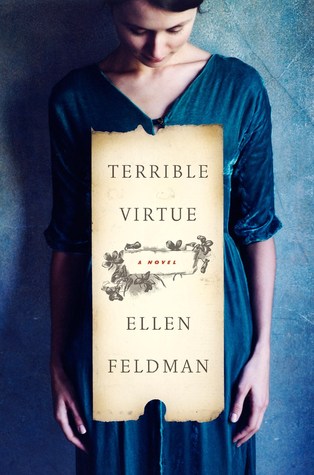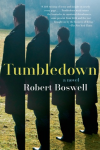Published by Harper
Publication date: March 22nd 2016
Genres: Fiction, Historical, Social Issues

Margaret Sanger is well-known as the founder of Planned Parenthood and the first advocate of birth control and family planning for women in the U.S. Ellen Feldman’s novel Terrible Virtue begins with Sanger’s impoverished childhood in Corning, New York as one of thirteen children—a fact that greatly shaped her attitude towards child bearing, as she watched her mother die young—drained by back-to-back childbirths, miscarriages, and the hard labor needed to sustain a family far beyond her husband’s ability to provide. Her mother’s final illness and death is even more poignant because it meant that Margaret had to come home from a school paid for by her older sisters, an education that she was never able to complete.
Terrible Virtue covers many of the salient points in Sanger’s biography as well as the important moments and events of her crusade to provide family planning information to women without the education or means to understand sex or birth control. Feldman writes the novel from Sanger’s point-of-view, but at various key points she shifts perspective to the voices of those around her. This allows insight to the feelings of the people most impacted by Sanger’s decisions, such as her sister who went to prison for the cause and nearly died from force feeding, while Sanger escaped to England rather than serve time. Or her children. Yes, children. Despite her antipathy towards marriage and anything that might inhibit her journey to independence she drops out of nursing school to marry a man she does not love. Later, even with access to family planning, she has three children that, at least from the novel’s perspective, she is never terribly interested in.
These seeming contradictions in crucial areas of Sanger’s life may be a key to the woman herself, but Terrible Virtue doesn’t make that clear. Instead, Feldman devotes a great deal of space to Sanger’s belief in free love by showcasing her affairs and sexual adventures. These may be facts, but the focus on Sanger’s physicality comes at the cost of understanding the emotional underpinnings of a woman who pioneered a movement that changed the rights of all women. Nuance is lost and she comes off as calculating and incredibly self-absorbed. I learned more about Margaret Sanger’s sex life in the novel, but what I really wanted to know was what went on in the mind and heart of this fascinating woman.

















Thanks for sharing this, Catherine; initially, I was very interested in this one, but I’m glad I held off. While I’m sure it has some merit, as you’ve highlighted, I’m feeling disappointed by the turn this one takes (or maybe doesn’t take?) in omitting some of the more intellectual aspects of her contributions to our society. Boo. 🙂
It was confusing, Tara, because it is well-written but very selective about what was covered. On the one hand, it did not go into her racism and belief in eugenics but on the other it read as more negative than positive.
Hmmm yeah, I think your last sentence sums up why I probably won’t read this one…that’s exactly what I’d want to know, too, and it sounds like this doesn’t really deliver. Maybe I’ll reach for nonfiction instead…
I was thinking the same thing, Monika- time to look for non-fiction on this woman! I get that sexual freedom may have been a big part of her life but I’m more interested in the intellectual aspects.
I got so excited when I realized you were reviewing a book about Sanger but I think I’ll have to let this pass. Have you read the Birth of the Pill? That was fantastic and she was a major focus.
No, I haven’t so thank you very much for the recommendation. I’m adding it to my TBR now. I get that authors have leeway with fiction and it’s why I like it, but this just never came together for me.
I read somewhere also that she founded Planned Parenthood intending also to promote it to a specific race she thought we needed less of in the world, or at least this country. Was there any inkling of that?
No, Jennine, and it was one of the failings I found in the book. There was no coverage of her belief in eugenics or her racism. I really felt like I would need non-fiction to understand her.